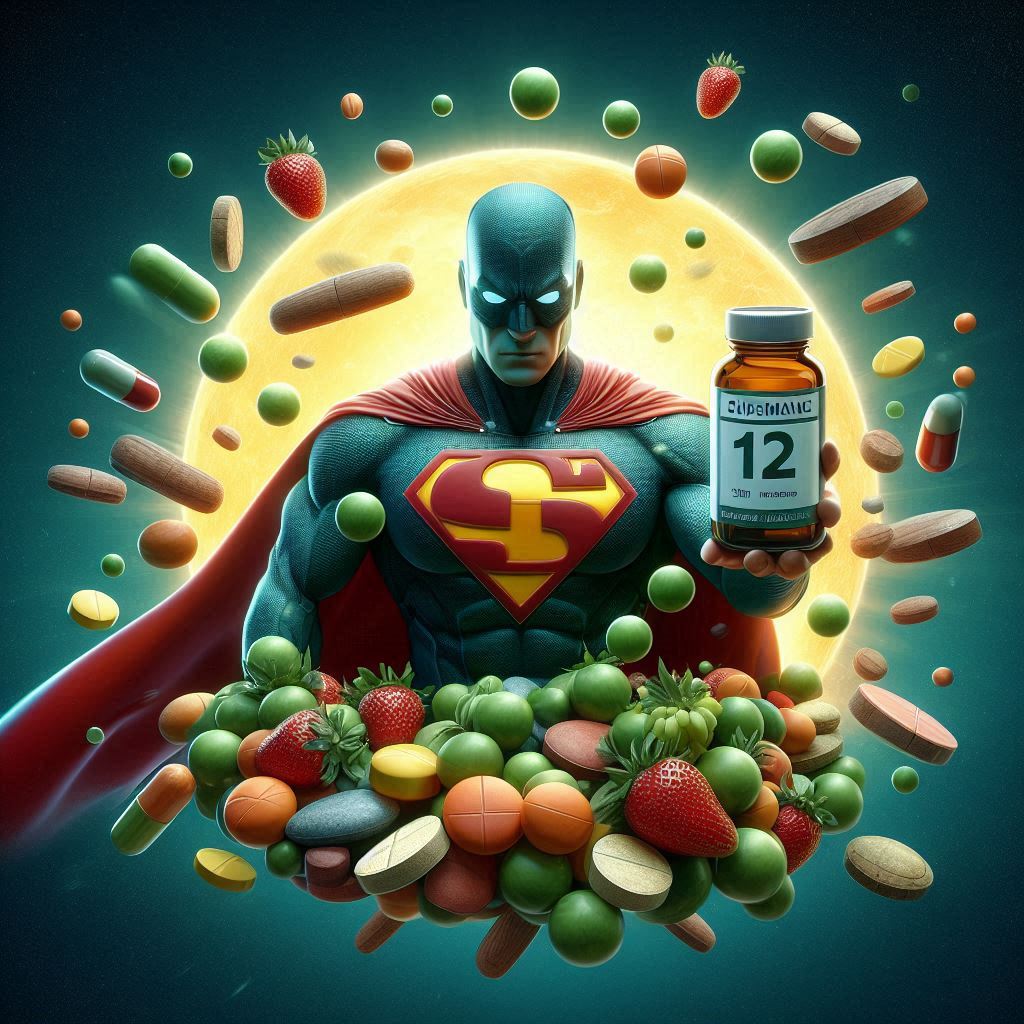Vitamin B12, also known as cobalamin, is a water-soluble vitamin essential for many bodily functions 🧬. It plays a crucial role in DNA synthesis, nerve function, red blood cell formation, and converting food into energy. Because the body cannot produce it, B12 must be obtained through diet or supplements 🥦.
Why is Vitamin B12 So Important?
Vitamin B12 acts as a cornerstone for several key processes:
- Nerve Health 🧠: B12 is crucial for the development, myelination, and function of the central nervous system, ensuring proper nerve signal transmission.
- Brain Function 💡: Essential for cognitive function and clear thinking; supplementation may slow cognitive decline in older adults with early-stage dementia.
- DNA Synthesis 🔬: Required for creating and regulating DNA, the genetic material in all cells.
- Red Blood Cell Formation 💉: Plays a vital role in red blood cell production; deficiency can lead to decreased red blood cell production and anemia.
- Energy Production ⚡: Helps convert food into energy, combating fatigue and weakness.
Health Benefits of Adequate B12 Intake
Getting enough vitamin B12 offers a range of health benefits:
- Prevents Anemia ❗: Essential for red blood cell formation, preventing megaloblastic anemia, characterized by large, abnormal red blood cells.
- Supports Brain Health 🧠: Crucial for nerve function and cognitive ability; may slow cognitive decline in older adults with early-stage dementia.
- May Prevent Macular Degeneration 👀: Supplementing with B12, along with B6 and folic acid, may help prevent age-related macular degeneration, an eye disease that can cause blindness.
- Supports Pregnancy Health 🤰: Adequate levels are crucial during pregnancy for fetal development and to reduce the risk of neural tube birth defects and low birth weight.
- May Improve Mood 😊: Plays a role in serotonin production, and a deficiency may be linked to clinical depression.
Who is at Risk of B12 Deficiency?
Certain groups are at higher risk of B12 deficiency:
- Older Adults 👵👴
- Vegans and Strict Vegetarians 🌿
- Pregnant Women 🤰
- Individuals Recovering from Surgery 🏥
- People with Certain Medical Conditions 🩺
- Those with Alcohol Use Disorder 🍷
Getting Enough Vitamin B12
The Recommended Dietary Allowance (RDA) for men and women ages 14 years and older is 2.4 micrograms (mcg) daily. For pregnancy and lactation, the amount increases to 2.6 mcg and 2.8 mcg daily, respectively. You can obtain B12 through:
- Animal products 🥩: Meat, shellfish, liver, fish, poultry, eggs, and dairy products are good sources of B12.
- Fortified foods 🥣: Fortified breakfast cereals and nutritional yeast can provide B12 for vegetarians and vegans.
- Supplements 💊: Oral B12 supplements are widely available. In some cases, a healthcare professional may prescribe B12 injections.
Important Vitamin B12 Facts
| Fact | Description |
|---|---|
| What it is | A water-soluble vitamin, also known as cobalamin, essential for various bodily functions. |
| Key functions | DNA synthesis, nerve function, red blood cell formation, and converting food into energy. |
| Dietary Sources | Meat, shellfish, liver, fish, poultry, eggs, and dairy products. |
| Deficiency Risks | Anemia, neurological problems, fatigue, and weakness. |
| Groups at Risk | Older adults, vegans/vegetarians, pregnant women, and individuals with certain medical conditions. |
| Recommended Daily Intake | 2.4 mcg daily for adults, 2.6 mcg during pregnancy, and 2.8 mcg during lactation. |
| Bioactive Forms | Methylcobalamin and 5′-deoxyadenosylcobalamin. |
| Common Supplement Form | Cyanocobalamin, which the body converts to active forms. |
Potential Risks and Interactions
Vitamin B12 is generally considered safe, and there is no known risk of harm associated with high intake. However, B12 supplements can interact with certain medications, including chloramphenicol, proton pump inhibitors, histamine H2 receptor antagonists, and metformin. If you take any of these medications, consult your doctor before adding a B12 supplement to your routine.
The Bottom Line
Vitamin B12 is essential for numerous bodily functions, and adequate intake is crucial for maintaining overall health. By understanding the importance of B12, recognizing risk factors for deficiency, and taking steps to ensure you’re getting enough, you can support your nerve health, brain function, energy levels, and overall well-being.
Citations:
[1] Wikipedia
[2] WebMD
[3] Harvard T.H. Chan School of Public Health
[4] ProVeg International
[5] Medical News Today
[6] Mount Sinai
[7] NIH Office of Dietary Supplements (ODS)
[8] NIH Office of Dietary Supplements (ODS)
